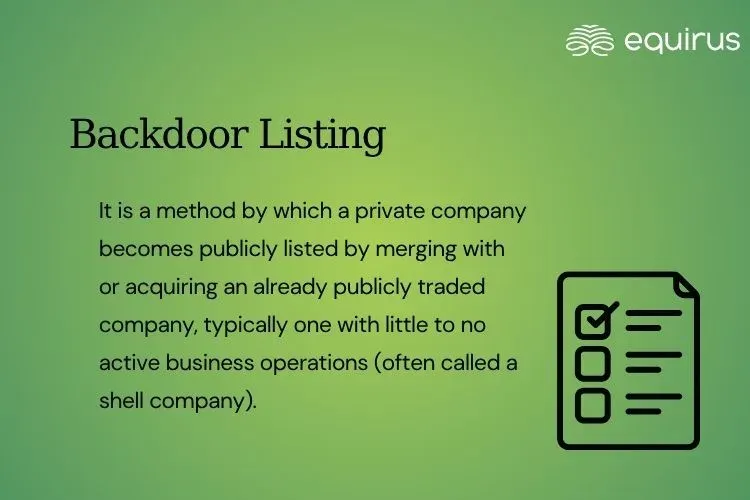Backdoor Listing

Key Highlights
-
It is a method by which a private company becomes publicly listed by merging with or acquiring an already publicly traded company, typically one with little to no active business operations (often called a shell company).
-
This allows the private company to bypass the traditional Initial Public Offering (IPO) process.
What is Backdoor Listing?
A Backdoor Listing, also known as a Reverse Merger or Reverse Takeover (RTO), is a method by which a private company becomes publicly listed by merging with or acquiring an already publicly traded company, typically one with little to no active business operations (often called a shell company).
This allows the private company to bypass the traditional Initial Public Offering (IPO) process.
How It Works?
-
A private company identifies a publicly listed shell company.
-
It merges with or takes control of the listed entity.
-
After the transaction, the private company’s shareholders usually own a majority of the combined entity.
-
The private company effectively replaces the business operations of the listed shell, gaining a stock exchange listing in the process.
Why Companies Use Backdoor Listings
| Reason | Explanation |
|---|---|
| Faster listing process | Avoids lengthy IPO procedures and regulatory approvals |
| Lower costs | Generally less expensive than conducting an IPO |
| Market access | Provides quick access to public capital markets |
| Brand and credibility | A public listing can improve visibility and investor confidence |
| Avoids market risk | Not dependent on timing or investor appetite, unlike IPOs |
Example
A startup in the fintech sector wants to go public but finds the IPO route too costly and time-consuming. It merges with a dormant publicly traded company listed on the NSE with no current operations. After the merger, the fintech startup assumes control and becomes publicly traded under the shell company’s name.
Risks and Concerns
1. Regulatory scrutiny: Authorities may question the transparency or legitimacy of the process.
2. Legacy issues: The shell company may have hidden liabilities or poor reputation.
3. Low investor confidence: Some investors view reverse mergers as a sign of weak fundamentals.
4. Short-term price volatility: Often leads to speculation and unstable share prices.
Backdoor Listings in India
While more common in the U.S. and other global markets, backdoor listings in India are rare and closely monitored by SEBI (Securities and Exchange Board of India). SEBI rules are designed to prevent misuse of shell companies for illegal activities like money laundering or price manipulation.
Backdoor Listing Vs. IPO
| Aspect | Backdoor Listing | Initial Public Offering (IPO) |
|---|---|---|
| Process | Through merger or acquisition | Fresh public issue of shares |
| Time Required | Shorter (few months) | Longer (6–12 months or more) |
| Cost | Relatively low | High (underwriting, legal, compliance fees) |
| Regulatory Review | Less scrutiny in initial stages | Extensive SEBI or SEC review |
| Transparency | Can lack full disclosure | Requires full prospectus and due diligence |
